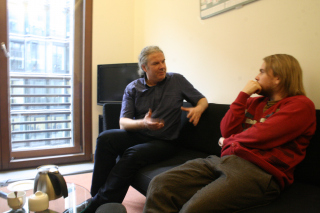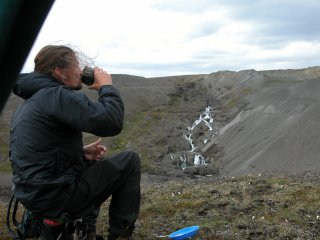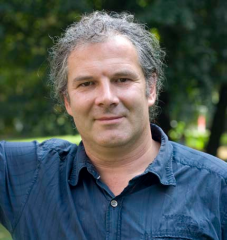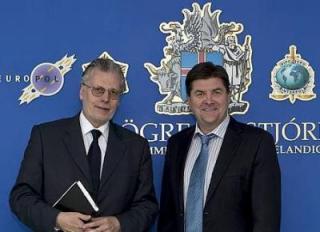Article by Jón Bjarki Magnússon, originally published on April 4th, in Icelandic newspaper DV. Translated from Icelandic by Saving Iceland.
German MP Andrej Hunko states that European police authorities are overtly and covertly planning increased surveillance of activists
Perhaps this is no longer common knowledge, but it still is a documented fact that the police authorities in the Western world operated in such a way throughout the whole of the 20th century.
“Though we have not yet managed to change the laws, we have managed to bring attention to the cause, which is very important.” So says Andrej Hunko who lately has been struggling against police spying on people involved with social movements in Europe. Hunko, who is a MP for the German left-wing party ‘Die Linke’, is concerned about the increased use of such espionage, especially as movements located on the political left wing are increasingly labelled as “leftist extremist and terrorists groups” that “have to” be monitored closely.
“I am concerned about this development. I am utterly opposed to the systematic criminalisation of international activists.” Among other things, Hunko, who is a member of the Committee on Economic and Monetary Affairs of the European Parliament, points out that plans are now being made to co-ordinate the laws of the member-states of the European Union, so that police spies from one country will be able to operate in another country without the special permissions that have been required. Hunko believes that this will subvert the work of social movements in Europe. “All this is happening very quickly and without an informed discussion, neither among members of national parliaments nor among members of the European Parliament, not to mention the public in those countries.”
Espionage Permitted in Iceland
In the beginning of March, I met Hunko at his office in the German parliament. Having forgotten to bring my passport, I was at first denied entrance into the German parliament. A woman sitting at the reception shook her head with a strict expression and maintained that she could do nothing to help me. But as I stood bewildered in the building’s lobby, I was suddenly greeted by a tall, smiling man, whose gait was light, his hair long and gray. Before long the doors opened up and he invited me to come along. After passing through security guards and metal detectors we started our journey and Hunko spoke briefly about the parliament building — this huge wing that consumed the two of us as we walked up the stairs towards his office.
Those who have followed DV’s coverage about the case of Mark Kennedy, the British police spy and agent provocateur, do probably already recognize Andrej Hunko. He has continuously kept the Kennedy case in the spotlight in Europe and has demanded answers from both the German and the European Parliaments. As for a short revision, it can be mentioned that Mark Kennedy, who operated under the alias Mark Stone, infiltrated the Icelandic environmentalist movement Saving Iceland at Kárahnjúkar in 2005. There, Kennedy surveyed the group’s operations, recorded discussions, documented and gathered information, which he then passed on to the British police and possibly the Icelandic authorities as well.
An article published in DV in May last year under the title “Espionage Against Saving Iceland Permitted”, revealed that according to Icelandic laws, Kennedy was allowed to spy on Saving Iceland. This has never been refuted by the Icelandic police authorities and Hunko believes that just as the German police, the Icelandic police were aware of Kennedy’s activities.
Police-Saboteurs
During a telephone interview with DV about a year ago, Hunko stated his opinion that Kennedy’s case is a sign of the threat faced by European social movements. Now, a year later, he reiterated his concerns regarding that by using agent provocateurs like Kennedy, the police in Germany and other countries have in fact encouraged illegal actions within activist movements. In an open letter last year, Hunko appealed to the Icelandic authorities to investigate Kennedy’s operations in Iceland, wherein he mentioned that Kennedy did commit sabotage during protests in Germany and thereby broke the law. Though it has never been confirmed, it is possible that something similar happened in Iceland.
Such tactics are well known among agent provocateurs and are implemented so as to directly impact the development of protests, often to cause disturbances or to defame a particular cause. Agent provocateurs have increasingly become the topic of discussion within European and North American social movements, but such agents are rarely unveiled, as these are clear violations of the laws — something that most police authorities prefer not to be implicated with. However, Hunko points out that as Kennedy’s case has been confirmed and documented, studying it may help understanding the wider context. “It is, in fact, great that the Kennedy case merged to the surface, as now we have a confirmed example of the methods that are implemented. Nevertheless, I think we have a long way to go.”
“Travesty of Democracy”
“By planting agent provocateurs into social movements, where they directly influence the operations of these movements, the respective states have in fact started participating in the organization of political resistance. That way, they can affect the groups’ actions and defame them by violating the law, as happened in Kennedy’s case. Then we are witnessing a travesty of democracy, which in my opinion is a huge problem,” Hunko states, but he was already concerned about this development before Kennedy’s case entered public discussion last year. However, not until that particular case was exposed did international media start talking about police spying in a broader context.
Hunko explains how he had tried to bring the attention of German media to Kennedy’s case, but nothing happened until British newspaper The Guardian started reporting it. “So we needed the British media in order to reach the German media, which is a bit strange,” Hunko says and points out that in the beginning, the Kennedy case got people to seriously think about police spying within democratic societies. But today people have become indolent again. In the wake of the Kennedy scandal it was revealed that the police department that he worked for in the UK has now been disbanded. This is an example of how the wool is pulled over the eyes of the public, Hunko says, as another police department was simply established to take care of the same task.
Lack of Information
“Despite the high profile of Kennedy’ case, it is by no means the sole instance of such police espionage,” Hunko says and adds that similar examples have already surfaced in Germany. Kennedy himself has also admitted his knowledge of other spies operating in Europe. Hunko says that in the German parliament, clear rules regarding freedom of information have made it easy for him and his fellow party-members to obtain information about the case. Thus it was possible to expose the fact that the German police were fully aware of Mark Kennedy‘s presence in Germany.
“The problem, however, is that it is way more complicated to obtain such information in the European Parliament,“ Hunko says and adds that new regulations are now being created, regarding the co-operation of European police espionage departments. “I consider it one of my tasks to bring this information to the public.“
Hunko believes that the Icelandic police — just as the German police — were aware of Kennedy’s presence and intelligence-gathering in Iceland. The Icelandic police authorities have not denied this and in a report by the National Commissioner, published in May last year, it is stated that judging from “the available data”, it is not possible to make clear if Kennedy, when in Iceland, was or was not “in collaboration or with the will and knowledge of the Icelandic police.”
The report also emphasised that the police is, in fact, allowed to use spies and agent provocateurs during the investigations of criminal activities. But the report failed to fulfil its simple objective, that is to bring forward answers to questions by Iceland’s Minister of the Interior. “There is nothing in it, it is just some foam,” Birgitta Jónsdóttir, MP for Hreyfingin, said about the report. She openly asked for clear information about the Icelandic police’s possible knowledge of Kennedy’s presence in Iceland. But so far, no clear answers have appeared.
Ögmundur Wants Increased Investigation Powers
Following the report, Iceland’s Minister of the Interior, Ögmundur Jónasson, stated that law amendments were needed regarding these issues — that it was necessary to change the law in a way that it does not allow the planting of spies into groups of political dissidents. By admitting the importance of law amendments, he admitted that up until then, the police had been allowed to spy on and infiltrate political groups, due to loopholes in the body of laws. On 22 March this year, he emphasised this point in parliament, during a discussion on so-called increased police investigation powers.
It has been confirmed that when environmentalists protested against the construction of the Kárahnjúkar dams, a foreign infiltrator was planted into the group. It has been stated that this policeman violated laws and rules by his operations here and along Europe […] The infiltrator was able to operate at Kárahnjúkar because of how unclear the regulations were regarding the police’s investigation methods. The legislation was far from being strong enough and in addition to that, there were a few regulations in force that were never made available to the public. This has now been changed. About a year ago, new regulations were passed regarding the police’s special investigation methods and actions. These regulations prohibit any kind of proactive police investigations of grass-roots groups or political organizations. Thus it can be mentioned that today, an infiltrator would not be permitted to operate at Kárahnjúkar.
According to the above-stated, the minister believes that the new laws on pre-emptive investigation powers will prevent espionage of such kind. On the contrary, Hunko claims that as long as movements, located on the left-wing of politics, are still systematically labelled as “left-wing extremists and terrorist organizations”, the increased investigation powers will be used to spy on such groups, just as other “terrorist groups”. Thus it is only a matter of definition.
Well Known Methodology
When I mention how unbelievable this case has been, bringing to mind James Bond films from the 1970’s or something that took place in the Soviet Union, Hunko replies calmly: “There is nothing particularly Soviet about this. Western police authorities used spies and agent provocateurs throughout the whole 20th century, in order to infiltrate political movements that were believed to pose a threat to certain interests. What comes to mind at first is the Gladio Project, which was organized by NATO after the Second World War, with the aim of stopping the upswing of communism in Italy.”
The Gladio Project, which has been the subject of various books, was a secret army run by the CIA, the British secret service, the Pentagon and NATO. From the end of the Second World War and up until 1990, the army operated in Italy and its primary goal was to fight against the upswing of communism in West Europe by any means necessary. To that end, American and British soldiers collaborated closely with right-wing terrorists, as explained in a book by Daniele Ganser, ‘NATO’s Secret Armies: Operation GLADIO and Terrorism in Western Europe’.
“The best kept, and most damaging, political-military secret since World War II,” was one of the ways The Observer used to describe the Gladio project after its exposure in 1990, while The Times stated: “The story seems straight from the pages of a political thriller.” In the wake of the exposure of the Gladio project in Italy in 1990, it became clear that such armies had been active in most Western European countries during the Cold War.
“Perhaps this is no longer common knowledge, but it still is a documented fact that the police authorities in the Western world operated in such a way throughout the whole of the 20th century,” Hunko says before he takes leave of me to continue preparations of questions that he plans to bring forward in parliament.



